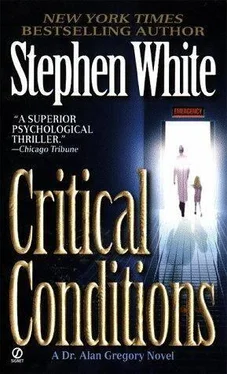Stephen White - Critical Conditions
Здесь есть возможность читать онлайн «Stephen White - Critical Conditions» весь текст электронной книги совершенно бесплатно (целиком полную версию без сокращений). В некоторых случаях можно слушать аудио, скачать через торрент в формате fb2 и присутствует краткое содержание. Жанр: Триллер, на английском языке. Описание произведения, (предисловие) а так же отзывы посетителей доступны на портале библиотеки ЛибКат.
- Название:Critical Conditions
- Автор:
- Жанр:
- Год:неизвестен
- ISBN:нет данных
- Рейтинг книги:4 / 5. Голосов: 1
-
Избранное:Добавить в избранное
- Отзывы:
-
Ваша оценка:
- 80
- 1
- 2
- 3
- 4
- 5
Critical Conditions: краткое содержание, описание и аннотация
Предлагаем к чтению аннотацию, описание, краткое содержание или предисловие (зависит от того, что написал сам автор книги «Critical Conditions»). Если вы не нашли необходимую информацию о книге — напишите в комментариях, мы постараемся отыскать её.
Critical Conditions — читать онлайн бесплатно полную книгу (весь текст) целиком
Ниже представлен текст книги, разбитый по страницам. Система сохранения места последней прочитанной страницы, позволяет с удобством читать онлайн бесплатно книгу «Critical Conditions», без необходимости каждый раз заново искать на чём Вы остановились. Поставьте закладку, и сможете в любой момент перейти на страницу, на которой закончили чтение.
Интервал:
Закладка:
“Right.”
“I’ll leave a message for Joel, he should know what we’re doing. And I’ll have my players together up here in, like, five minutes. You get her ready, okay? Let her know what’s expected of her and let her know that she’ll be surrounded by sumo wrestlers.”
I wanted to kiss the head of the head nurse. I said, “Thanks, Georgia, a lot.”
“The karma price is too damn high for some omissions in life. Refusing this visit, I’m afraid, would be way off the negative karma scale. No thanks are necessary.”
To ensure against omissions of my own, I phoned down to the ICU, identified myself, and asked to speak to Chaney’s nurse. The ward clerk said she wasn’t available.
I asked, “How is Chaney doing?”
Quick exhale. “Bad. Real bad.”
“Thanks, I’ll call back.”
I felt guilty for checking on John Trent. But at least I knew that he hadn’t been lying.
Nineteen
My feelings were jumbled, which is not a good posture for a clinical psychologist during a crisis. The strongest feeling I had was that I wanted to protect Merritt from the world. From death, and tragedy, and neglect, and hostility, and loss. Right then, I didn’t much consider the atrocity she was accused of committing. I only wanted to shield her from the horrors that hovered nearby. I knew my feelings were paternal, and not therapeutic. But they were as big as life and I couldn’t ignore them.
Paradoxically, my actual job was to protect Merritt from herself. Despite all the objective evidence-and given a near-fatal suicide attempt, I didn’t require much more objective evidence-I was having trouble convincing myself that she was actually in grave danger of self-destruction. If there was any ambivalence on my part about permitting Merritt to visit with Chaney in the ICU, it wasn’t about fear that she would attempt suicide while free of the safety of the adolescent psychiatry unit. Rather, it had to do with an ill-conceived sense that nothing awaited her downstairs but further pain and suffering.
I didn’t want her to have to experience that anymore.
If Chaney survived this night, it was likely that a night where she didn’t survive was lurking on a near horizon. The cards determining this baby’s eternal life were being dealt by fate, or by some callous God I didn’t want to contemplate, or by some bureaucrat at MedExcel. I felt an absolute helplessness that I could do nothing to prevent Merritt from feeling the pain of watching her sister die. All I could do was help her prepare for it.
In the meantime, though, I was charged with keeping Merritt alive during the visit to the intensive care unit.
With that I had some help. Three counselors who had volunteered to stay after shift change and two uniformed hospital security guards accompanied Merritt and me on the journey from the fourth floor to the second. One of the guards used a key to make sure we had an elevator to ourselves on our way down to the ICU.
As we made our way down, I had an eerie sense of having come full circle with Merritt. I had met her days before in an intensive care unit and now she and I were on our way back to one. The circle, I hoped, wasn’t really complete. Being surrounded by benevolent guards and having a little sister near death was no way to complete it.
Merritt’s poise was remarkable. She hadn’t panicked when I told her that her sister was in a new medical crisis. Merritt had stood from her bed as soon as she heard my words, expecting to be taken immediately to her sister’s bedside. Assuming it was her right to be there.
Which it was, of course. I wasted a minute or two telling her about suicide precautions and warning her that staff would be with her at all times.
She listened impatiently, picking at the sleeve of her T-shirt. This one was black and read CHURCH GIRL in a soft script across the front. I realized that I didn’t know youth culture well enough to know whether the church girls were a rock ’n’ roll band, and that I didn’t know my patient well enough to know whether or not she was making some religious statement with her choice of T-shirts.
When I was done with my speech, she raised her eyebrows tenderly and mouthed the word, “Please.”
I asked myself whether I trusted her. I knew I did. We left her room.
As we reached the entrance to the intensive care unit I asked the security guards to wait in the hall, one by each of the two doors to the unit. I asked the mental health counselors to wait in the nursing station and to keep their eyes open should Merritt require their help.
Merritt and I entered the ICU through a tiny vestibule where we took turns washing our hands with foul-smelling antibacterial soap. We pulled on gowns. Merritt’s preparations were deliberate and measured. She washed her hands with care, lathering liberally, rinsing well. She was patient. That’s what John Trent had told me about his stepdaughter. She’s patient.
The intensive care unit at The Children’s Hospital is a long rectangular space with a glassed-in nursing station on the center of one of the long walls. Beds and cribs are spaced regularly along the other walls. Sometimes curtains are pulled between them, sometimes not. Behind each bed were enough electronics to land a 777 in a whiteout.
Chaney’s bed was in the far corner. Nurses, doctors, and assorted health techs surrounded the bed, their activity a magnet for everyone’s attention. John Trent stood back from the crowd that had assembled around his young daughter’s bed. A pale yellow hospital gown was tied behind his neck, but not at his waist. His arms were crossed loosely in front of him.
Merritt left my side without asking permission. I didn’t know what she planned to do, but sensed it would be the right thing. Her slippered feet made hardly a sound as she crossed the unit and approached her stepfather and embraced him from behind. He turned to face her and the tears he had been damming spilled loose in a silent torrent as the two of them hugged.
Merritt cried with him. She wiped a tear from her stepfather’s cheek. I’d never met Chaney and, by myself in the center of the big room, I was crying for her, too. And for John. And for Merritt.
I stood back respectfully at a distance of about ten feet. John Trent began to whisper into Merritt’s hair and I couldn’t tell what he was saying, didn’t think I had a right to know. After about fifteen seconds, Merritt stepped back from him, gazed at him ruefully, took his hand, and began to lead him toward Chaney’s bed.
She released Trent’s hand, or he released hers-I couldn’t tell-at the foot of her sister’s bed and she weaved naturally, ducking and bending her way through the assembled health care workers and their equipment, toward the head of Chaney’s bed. Merritt maneuvered the maze with ease and grace, as though she was threading through friendly classmates jammed around her locker at school. Once she was through the throng I could no longer see her.
A doctor approached Trent at the foot of the bed. Trent said something that earned him an enthusiastic reply. He added a few more words. The doctor nodded again, looked my way, and smiled warmly. I waved and watched her stride back to Chaney’s bedside. I assumed it was Chaney’s primary doc, temporarily thrust into a secondary role by the acute crisis. The critical care specialists would run this show for now.
Trent continued to stand back. I took a few steps forward and joined him.
After a pause, he said, “Thanks.”
I remembered Georgia’s karma warning. “None needed. Any change, John?”
“She’s laboring badly. Rapid breathing. Respirations are up to sixty. Something new is going on with her lungs. They don’t know whether it’s a new disease process or a reaction to one of the meds. There’s a pulmonologist in there with her and a respiratory therapist. They’re trying to get it under control. So far without any luck.”
Читать дальшеИнтервал:
Закладка:
Похожие книги на «Critical Conditions»
Представляем Вашему вниманию похожие книги на «Critical Conditions» списком для выбора. Мы отобрали схожую по названию и смыслу литературу в надежде предоставить читателям больше вариантов отыскать новые, интересные, ещё непрочитанные произведения.
Обсуждение, отзывы о книге «Critical Conditions» и просто собственные мнения читателей. Оставьте ваши комментарии, напишите, что Вы думаете о произведении, его смысле или главных героях. Укажите что конкретно понравилось, а что нет, и почему Вы так считаете.












